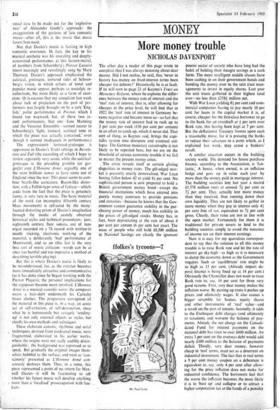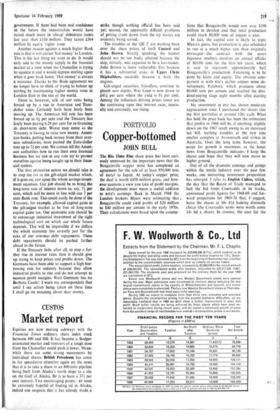More money trouble MONEY
NICHOLAS DAVENPORT
The other day a reader of this page wrote to complain that I was always moaning about dear money. Did I not realise, he said, that 'never in history has money on fixed-interest terms been cheaper for debtors?' Historically he is at fault. If he will turn to page 23 of Keynes's Tract on Monetary Reform, where he explains the differ- ence between the money rate of interest and the 'real' rate of interest, that is, after allowing for changes in the price level, he will find that in 1922 the 'real' rate of interest in Germany be- came negative and became more so—so fast that the money rate of interest had to rush up to 3 per cent per week (156 per cent per annum) in an effort to catch up, which it never did. That sort of thing, as Keynes said, brings the capi- talist system into disrepute and eventual col- lapse. The German monetary catastrophe is not likely to be repeated here, but we are on the threshold of serious economic trouble if we fail to master the present money crisis.
The crisis reveals itself in certain glaring disparities in money rates. The gilt-edged mar- ket is presently utterly demoralised, War Loan having fallen below 42 to yield 8+ per cent. No sophisticated person is now prepared to hold a British government money bond—except the financial institutions which have entered into purely money contracts to provide pensions and annuities—because he knows that the Gov- ernment cannot guarantee stability in the pur- chasing power of money, much less stability in the prices of gilt-edged stocks. Money has, in fact, been depreciating at the rate of about 4 per cent per annum (6 per cent last year). The mass of people who still hold £8,500 million in National Savings are clearly the ignorant
poorer sector of society who have long bad the habit of holding their meagre savings in a cash form. The more intelligent middle classes have been cashing in on their government bonds and handing the money over to the unit trust man- agements to invest in equity shares. Last year the unit trusts gathered in their highest total ever—no less than £258+ million net.
With War Loan yielding 8+ per cent and com- mercial companies having to pay nearly 10 per cent for loans in the capital market it is, of course, cheaper for the first-class borrower to go to the bank for an overdraft at I per cent over Bank rate, this having been kept at 7 per cent. But the deflationist Treasury frowns upon such a reasonable move, for it is pressing the banks to reduce their advances to a point which, as I explained last week, may cause a bankers' revolt.
A similar situation occurs in the building society world. The demand for house purchase finance, according to the Association, is 'fan- tastic,' A house, when owned, is an inflation hedge and goes up in value each year by more than the money paid in mortgage interest. The building societies lent last year a record £1,578 million (net) at around 7+- per cent to 7* per cent. They actually lent more money than they received, thus running down their own liquidity. They are not likely to gather in more money when they pay in interest only 41- per cent free of tax, equivalent to 7+ per cent gross. Clearly, their rates are not in line with the open market. Fortunately for them it is traditional for private savers to lend to the building societies simply to avoid the nuisance of income tax on their interest earnings.
Now it is easy for my querulous correspon- dent to say that the solution to all-this money trouble is to raise Bank rate and let the rate of interest go sky-high—as high as it is necessary to damp the economy down as the Government requires. Such an 'equilibrium' rate might be as high as 15 per cent. (Already import de- posit-finance is being fixed up at 14 per cent.) Obviously the Chancellor does not want to raise Bank rate to, say, 10 per cent for three very good reasons. First, very dear money makes the inflation worse. By putting up rents it pushes up prices and ultimately wages. It also causes a bigger scramble for houses, equity shares and other instruments of 'real' value—and a revolt on the part of tenants. Secondly, it adds to the Exchequer debt charges (and ultimately to taxation), and worsens the balance of pay- ments. Already the net charge on the Consoli- dated Fund for interest payments on the national debt has risen to over £600 million. An extra 3.per cent on the overseas debt would add nearly £100 million to the balance of payments deficit. Thirdly, very dear money, however cheap in 'real' terms, must act as a deterrent on industrial investment. The fact that in real terms a 9 per cent money coupon on a debenture_ is equivalent to, say, only 4 per cent after allow- ing for the price inflation does not make for industrial confidence. The borrowers feel that the worse the inflation becomes the more likely it is to 'bust up' and collapse or to attract a higher corporation tax at the hands of a panicky
government. If there had been real confidence in the future the industrialists would have raised much more in 'cheap' debenture issues last year than £310 million. They raised f364 million by equity 'rights' issue.
Another reason against a much higher Bank rate is that it will attract 'hot money' to London. This is the last thing we want to do. It would only add to the money supply in the financial market at a time when the Chancellor is trying to squeeze it and it would depress sterling again when it goes back home. 'Hot money' is always a nuisance. Thanks to the Basle agreement we no longer have to think of trying to bolster up sterling by maintaining higher money rates in London than in the rest of the world.
There is, however, talk of -our rates being forced up by a rise in American and 'Euro- dollar rates. Certainly both -have lately -been moving up. The American bill rate has been forced up to 61 per cent and the Treasury 'has lately 'been paying 6.29.per cent for re-financing its short-term debt. Worse may come as the Treasury is having to raise new money. Ameri- can-banks, pulling back money from their over- seas subsidiaries, have pushed the Euro-dollar rate up -to 74 per cent. We cannot tell the Amen- -can authorities how to run their own financial business but we can at any rate try to protect ourselves against being.caught up in their finan- cial system.
The first protective action we should take is to stop the rot in the gilt-edged market which, if it-goss.on, can upset the whole savings-invest- ment equation. Our job should be to bring the long-term rate of -interest down to, say, 71 per cent, -which will be more in line with our 7 per cent Bank rate. This-could easily be done if -the Treasury, for example, allowed •capital gains in -the gilt edged market to be free of long-term capital _gains -tax. Our :economic .aim should 'be to encourage industrial investment of the right technological sort on which our whole future depends. This will be impossible if we -deflate the whole economy too severely just for the -sake of -o-ur overseas debt repayments. These debt repayments should be pushed further ahead in the future.
If the Treasury fails, after all, to stop a fur- ther rise in interest rates then it should give up trying to keep prices and profits down. The Germans have been able to support a high-bor- rowing rate for industry because they allow industrial profits to wise and do not attempt to squeeze profit margins. West Germany has no Barbara Castle! I warn my correspondent that -until I see action .being taken on these lines I-shall go on moaning about dear money.



































 Previous page
Previous page